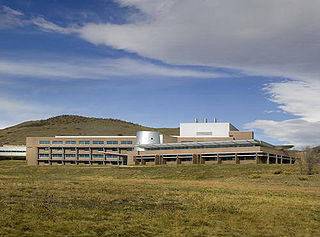
The National Renewable Energy Laboratory (NREL) specializes in the research and development of renewable energy, energy efficiency, energy systems integration, and sustainable transportation. NREL is a federally funded research and development center sponsored by the Department of Energy and operated by the Alliance for Sustainable Energy, a joint venture between MRIGlobal and Battelle. Located in Golden, Colorado, NREL is home to the National Center for Photovoltaics, the National Bioenergy Center, and the National Wind Technology Center.
Suntech Power Holdings Co., Ltd. is a Chinese producer of solar panels, with 2,000 MW (2,700,000 hp) of annual production capacity by the end of 2011. It is headquartered in Wuxi, Jiangsu. Shunfeng International Clean Energy Limited, a HKSE listed renewable energy investment and Independent Power Producer company, acquired Suntech in 2014 following Suntech's bankruptcy in 2013. With offices or production facilities in every major market, Suntech has delivered more than 13,000,000 solar panels to thousands of companies in more than 80 countries around the world. As the center for the company's global operations, Suntech headquarters, in Wuxi, China, features the world's largest building integrated solar facade.

Acumen is a nonprofit impact investment fund with over 15 years’ experience in investing in social enterprises that serve low-income communities in developing countries across Sub-Saharan Africa, South Asia, Latin America, and the United States. It aims to demonstrate that small amounts of philanthropic capital, combined with large doses of business acumen can result in thriving enterprises that serve vast numbers of the poor. Over the years, Acumen has invested $115 million in 113 companies and has had a successful track record in sourcing and executing investment opportunities in the clean energy, health care and agriculture sectors.

Many countries and territories have installed significant solar power capacity into their electrical grids to supplement or provide an alternative to conventional energy sources. Solar power plants use one of two technologies:

Solar power in Australia is a fast growing industry. As of September 2021, Australia's over 2.96 million solar PV installations had a combined capacity of 23,466 MW photovoltaic (PV) solar power, of which at least 4,117 MW were installed in the preceding 12 months. In 2019, 59 solar PV projects with a combined capacity of 2,881 MW were either under construction, constructed or due to start construction having reached financial closure. Solar accounted for 9.9% of Australia's total electrical energy production in 2020.
For solar power, South Asia has the ideal combination of both high solar insolation and a high density of potential customers.
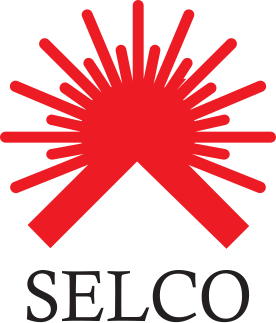
SELCO Solar Light Pvt. Ltd. is a for-profit social enterprise based in Bangalore, India. SELCO has played an instrumental role in improving living standards of poor households in rural India especially in the state of Karnataka through solar energy based interventions and low smoke cook stoves. In recognition of the services towards reduction of the gap in access to energy, SELCO has been awarded the prestigious Ashden Awards twice, in years 2005 and 2007. SELCO India was founded in 1995 by Dr.Harish Hande an alumnus of IIT Kharagpur with INR 15,000 funding from its co-founder Mr. Neville Williams. SELCO India has installed solar light systems in 350,000 houses till date.

Yingli, formally Yingli Green Energy Holding Company Limited -. Yingli Green Energy Holding Company Limited, known as "Yingli Solar," is a solar panel manufacturer. Yingli Green Energy's manufacturing covers the photovoltaic value chain from ingot casting and wafering through solar cell production and solar panel assembly. Yingli's photovoltaic module capacity is 4 GWs.

Ghana generates electric power from hydropower, fossil-fuel, and renewable energy sources. Electricity generation is one of the key factors in order to achieve the development of the Ghanaian national economy, with aggressive and rapid industrialisation; Ghana's national electric energy consumption was 265 kilowatt hours per capita in 2009.
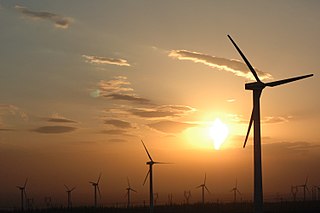
Renewable energy in developing countries is an increasingly used alternative to fossil fuel energy, as these countries scale up their energy supplies and address energy poverty. Renewable energy technology was once seen as unaffordable for developing countries. However, since 2015, investment in non-hydro renewable energy has been higher in developing countries than in developed countries, and comprised 54% of global renewable energy investment in 2019. The International Energy Agency forecasts that renewable energy will provide the majority of energy supply growth through 2030 in Africa and Central and South America, and 42% of supply growth in China.

ECAMI is a renewable energy business based in Nicaragua, selling solar PV, wind power and hydroelectric systems. ECAMI was founded in 1982 by Luis Lacayo Lacayo, to supply radio communications equipment in rural areas of Nicaragua where infrastructure had been destroyed during the prolonged civil conflict and revolution. Photovoltaics (PV) were the ideal way of powering this equipment, because there was no grid electricity. Many other opportunities for PV became apparent to Lacayo, like home lighting, battery-charging, water pumping and refrigeration. Over the years the provision of renewable energy systems became more important than communications and is now the main activity of ECAMI.

Riverstone Holdings is a multinational private equity firm based in New York City focused on leveraged buyout, growth capital, and credit investments in the energy industry and electrical power industry sectors. The firm focuses on oil and gas exploration, midstream pipelines, electricity generation, energy and power services, energy and power technology, and renewable energy infrastructure and technology. Riverstone has raised approximately $41 billion since the firm's inception in 2000.
E+Co is a non-governmental organization based in Bloomfield, New Jersey, United States, that from its founding in 1994 to its restructuring in 2012 made over 250 clean energy investments in developing countries. Over these 18 years, E+Co maintained field offices in San Jose, Costa Rica, Bangkok, Thailand, Dar es Salaam, Tanzania and Accra, Ghana. The company's name is pronounced, "E and Co".
Husk Power Systems, founded in 2007, is a startup company based in Fort Collins, Colorado, that provides clean energy services to off-grid or weak grid rural communities in East Africa, West Africa and South Asia, primarily by building renewable energy mini-grids. Its original technology generated electricity using a biomass gasifier that created fuel from rice husks, a waste product of rice hullers that separate the husks as chaff from the rice, a staple food in both Asia and Africa. In the mid-2010s, with the rapid decline in the price of solar PV and batteries, Husk pivoted its business model to focus more on solar-plus-storage mini-grids, while continuing to use biomass, in combination with solar, to serve communities with larger electricity demand. In 2021, Husk Power was recognized in the REN21 Renewables Global Status Report as the first mini-grid company to achieve significant scale, by surpassing 100 solar hybrid community mini-grids, and 5,000 small business customers. The company was co-founded by Manoj Sinha, Gyanesh Pandey, Ratnesh Yadav, and Chip Ransler, and the Chairman of the Board is Brad Mattson.
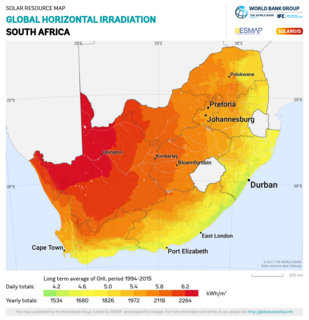
Solar power in South Africa includes photovoltaics (PV) as well as concentrated solar power (CSP). In 2016, South Africa had 1,329 MW of installed solar power capacity. Installed capacity is expected to reach 8,400 MW by 2030.

Africa is often considered and referred as the "Sun continent" or the continent where the Sun's influence is the greatest. According to the "World Sunshine Map", Africa receives many more hours of bright sunshine during the course of the year than any other continent of the Earth: many of the sunniest places on the planet lie there.

Mahindra Susten Pvt. Ltd., formerly Mahindra EPC Services Pvt. Ltd. , is part of the USD 19 billion Mahindra Group. They are a portfolio company under the Cleantech arm of Mahindra Partners.
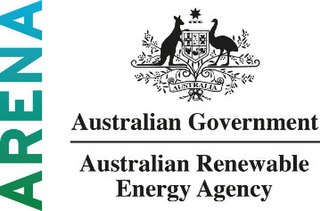
The Australian Renewable Energy Agency (ARENA) is an independent agency of the Australian federal government, established in 2012 to manage Australia's renewable energy programs, with the objective of increasing supply and competitiveness of Australian renewable energy sources.
M-Kopa is an African connected asset financing platform that provides underbanked customers in Africa to essential products including solar lighting, televisions, fridges, smartphones & financial services. M-Kopa was launched commercially in 2012 and is headquartered in Nairobi. The company is currently operating in Kenya, Nigeria and Uganda.
Kita Solar Power Station, is a 50 MW (67,000 hp) solar power plant in Mali. At the time of its commissioning, in April 2020, it was the largest, grid-connected solar power station in West Africa.













